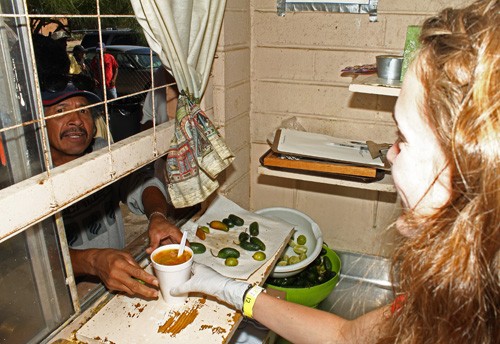By 8:15 a.m. on Mondays and Thursdays, some students are already in their cars, pulling out of the parking lot of the St. Thomas More Catholic Newman Center at the UA, on their way to feed the homeless at Casa Maria, a Catholic worker community.
Located about two miles south of the university, many people in southern Tucson depend on Casa Maria for food, clothes and showers.
Krista Bolin, a UA physiology senior, helps minister at the Newman Center and became aware of Casa Maria, 401 E. 26th St., her sophomore year after participating in an alternative spring break trip to Chiapas, Mexico. After learning about the social and economic injustices in Mexico, she began volunteering at Casa Maria.
Bolin described her move from Phoenix to Tucson as a “”culture shock,”” particularly on campus and Fourth Avenue.
“”On campus, it’s like a bubble,”” she said. “”People are privileged to go to school, while Casa Maria is a different world — people go there to get their next meal.
“”I think everyone has had an encounter on Fourth Avenue or somewhere with a poor person, but there’s a different reality when you see them at Casa Maria,”” Bolin said. “”I never realized it until I went.””
According to the city data report, the estimated median household income in South Tucson was $18,492 in 2008. The rest of the state was at $50,958.
Volunteer Matthew Campbell graduated from the UA in May and said the reason he volunteers is “”to expose people to issues of social justice and to look at poverty, not just through the lenses of the news or statistics in class, but to see it face to face.””
He said getting people involved in local politics is important.
“”We work with people to register to vote and get them involved with decisions being made just two miles away,”” Campbell said.
Because he lives in a house across the street from Casa Maria, he sees people sitting on his front steps every morning.
He does not look at them as homeless, but as brothers and sisters,
“”Just because they don’t have jobs, doesn’t make them any less worthy of love,”” he said. “”That’s exactly what Casa Maria tries to do — love and create justice.””
Casa Maria distributes about 500 to 600 lunches and 150 to 200 family food bags per day, according to Brian Flagg, who has lived and worked at Casa Maria since 1983.
Flagg said Casa Maria is also focusing on the Sun Tran bus system because many of the people who come to Casa Maria rely on it.
“”To persecute them by raising prices or cutting routes is sinful, when you have all the wealth that we have in this community,”” Flagg said. “”We are not gonna be poor and without papers and get run over by the rich guys. Screw that, there is still democracy in this country.””
Flagg said he has a great respect for the students from the Catholic Newman Center who come and make sandwiches twice a week. He said the future is the youth and they are serious about living out the teachings of their faith.
Chris Imperial, 44, has been homeless for 18 years and enrolled in the program 10 days ago. He said he chose the center because it helps you look for work.
“”I chose that shelter for that reason, I don’t like to be broke,”” Imperial said. “”I don’t wanna be homeless for the rest of my life.””
Imperial grew up in Tucson and never went to school but had a job in landscaping before he was homeless. When his company went out of business, he lost his job and has been struggling to find work since.
“”They treat you well at the shelters. Casa Maria gives you clean clothes and they do laundry for you,”” he said. “”They really take care of you.””
He said is grateful for the students he sees making sandwiches and helping.
Lurlene Johnson says she is at Casa Maria as soon as the doors open in the morning. She has been going there for the past eight years and is the only member of her family who needs to go for food.
Johnson used to work as a cashier at a supermarket, but became an alcoholic and drug user. She gave up on work, she said, but has started to receive counseling.
Billy Lackey, a South Tucson police officer, knows Johnson and many others who go to Casa Maria.
He explained that some people get involved with drugs and alcohol and then migrate to Casa Maria, because they know they will be taken care of.
Lackey said his education and career in law enforcement are the reasons he comes to Casa Maria.
“”A lot of people here I arrested, but they still come up to me and talk, because I don’t do it out of malice,”” Lackey said. “”I do it to protect them.””









